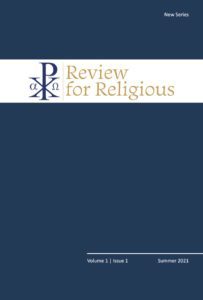We invite you to preview Review for Religious vol. 3, no. 1!
The latest issue of the print journal is out! It features a diverse set of articles, including:
- a reflection on diversity and division within religious life and how communities might move forward on this issue;
- a canonical analysis of recent guidelines on separation from a community;
- articles on religious life and the Jubilee year, fraternity, and aging, plus book reviews!
You may preview the issue by downloading the table of contents, reading the sample article, or previewing excerpts from all the articles below.
Excerpts From Volume 3, No. 1
This article is addressed to superiors and religious alike. It provides a practical overview of the norms in force concerning separation from the institute, and aims to help superiors apply the procedure correctly, on the one hand, and to help the religious know and safeguard their rights in the event of separation from the institute, on the other. Therefore, in this article, the legal provisions of the Code of Canon Law concerning separation from the institute are summarized on the basis of the Guidelines and the most recent changes to the Code of Canon Law to provide a practical guide on how to proceed in a case of separation from the institute.
To those who give greater emphasis to inclusivity, it seems as if others are wanting to move backwards. To those who emphasize identity, it seems as if others are unwilling to move forward. If inclusivity is a priority, others are too conservative, hanging on to things that have been left behind. If Catholic identity is emphasized, then others are the real conservatives, unable to change and move on and let go, trying to sustain a quite recent status quo, reading the signs of the times as they were fifty years ago rather than as they are now. To each the other looks as if he is stuck.
Drawing on St. Thomas Aquinas’s rich theology of hope and of the religious state, this article aims to demonstrate that the religious life is a school of hope. I will first consider the fittingness of such an approach. After establishing that the religious life may be called a school of hope, I will proceed to consider Aquinas’s theology of hope. A few general remarks on the religious state in Church teaching and Aquinas’s teaching will follow, concluding with an overview of the evangelical counsels and their connection to hope.
With all the suffering, difficulty, and trauma the human family and more-than-human world has experienced over the centuries, some people might view the claim that the world most needed brothers to be, at best, hopelessly idealistic or even simply absurd. But for those called to religious life, we ought to know the truth of this statement intuitively and profoundly. For while much of the world might view the absolutely essential character of fraternitas to be foolish in the face of the dire circumstances of our time, I would point to the inspiration of St. Francis of Assisi, the founder of the community known as lesser brothers, who referred to himself as idiota et simplex, unlearned and simple, who was known as a “fool for Christ.” Francis of Assisi’s foolishness was not rooted in the lack of education he unabashedly acknowledged, nor was it the result of low intelligence, but instead his particular kind of foolishness arose from his commitment to a logic, a paradigm, a wisdom not of this world, but of God (1 Corinthians 1:1–31).
The present article draws on ethnographic data collected over a period of fifteen years in a Franciscan convent in the midwestern United States beginning in 2008. The data include audio and video recordings in which sisters make sense of this demographic decline in the number of women religious in both their community and in the nation. They have asked themselves, what is the right response to this dramatic shift?
